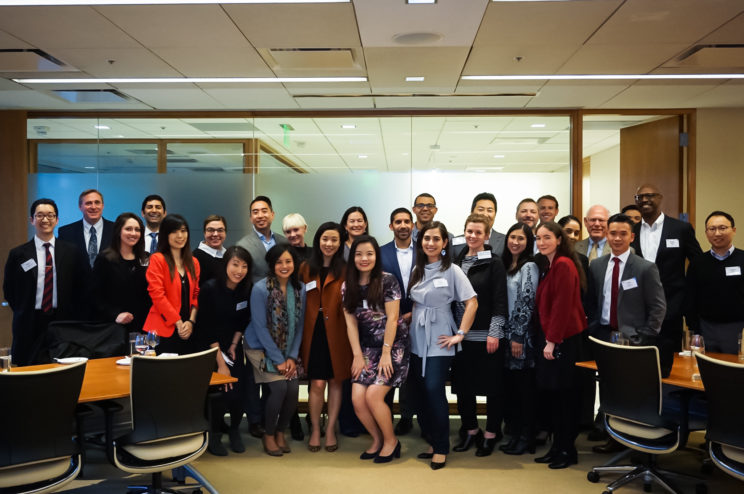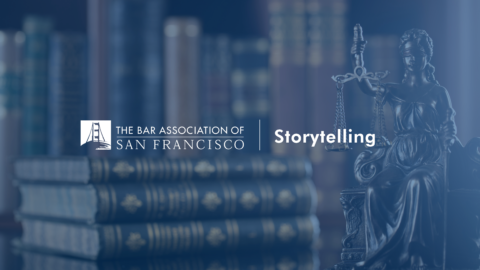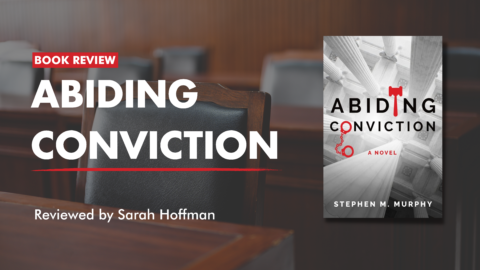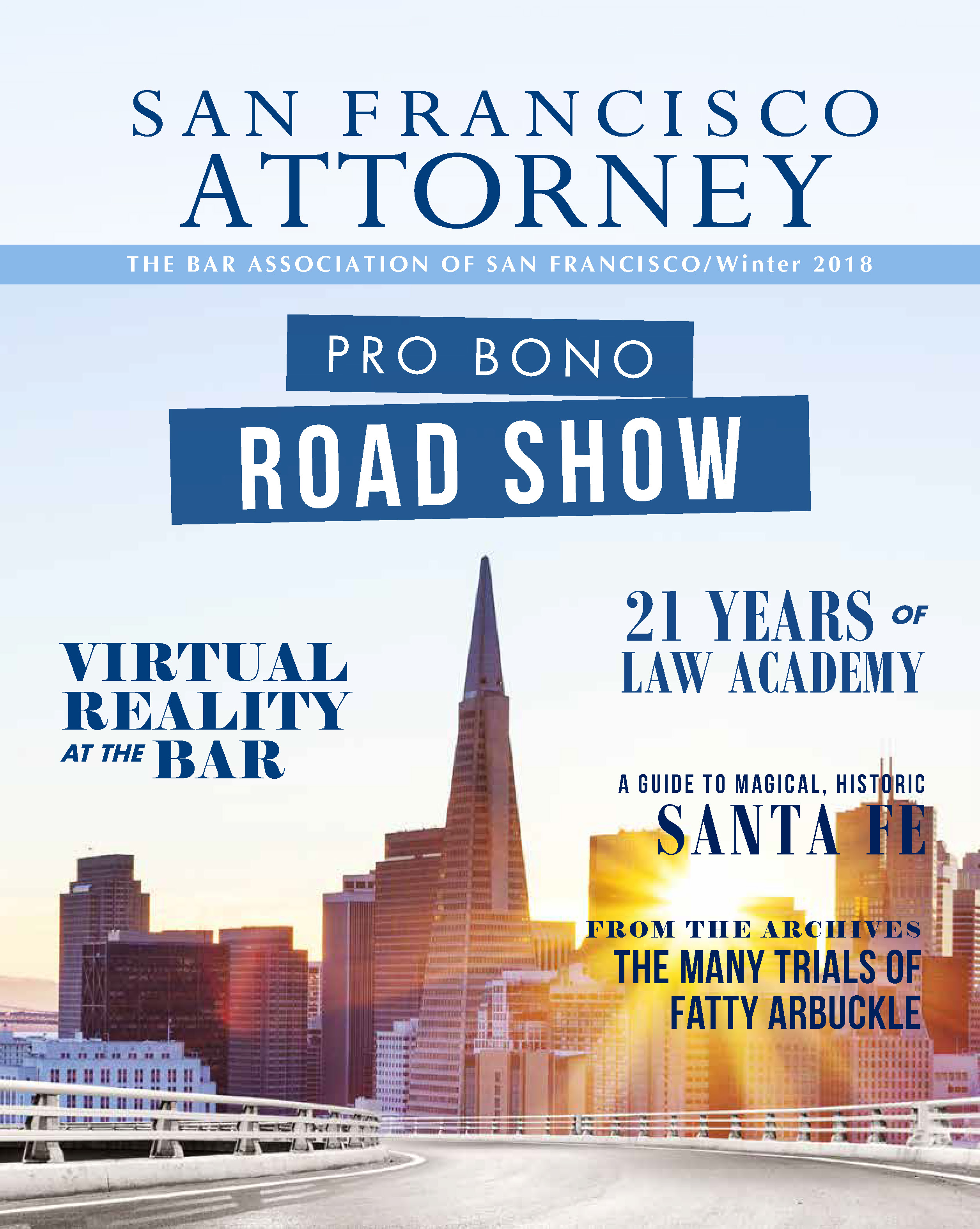
Throughout his term as president of the Bar Association of San Francisco (BASF), Malcolm Heinicke promoted “pro bono for the soul” to encourage people in the Bay Area legal community to find meaningful ways to give back to the larger community through pro bono services.
It was a sentiment shared by members of the BASF and Justice & Diversity Center (JDC) boards. “People that don’t have resources to access legal services need our assistance now more than ever before,” said Anjali Kulkarni, an associate at Duane Morris. “It’s important, not only as attorneys, but as human beings.”
The challenge is knowing how to start. “People talk about their desire to help in the community,” said Heinicke. “They also talk about how busy they are and how hard it is to try something new.”
Heinicke first addressed this dilemma at the December 2017 Annual Membership Luncheon, publicly making a commitment to visit firms and in-house departments during his year-long term to “explain how you can volunteer in an efficient manner that best suits your interests.” Furthermore, he promised, he and Gloria Chun, director and managing attorney of JDC’s Pro Bono Legal Services, would show members how “within just a few hours (yes, just a few hours), you can make a significant difference in the life of a fellow San Franciscan. And, I bet, the experience will reward you as well.”
They didn’t reinvent any wheels. Instead, they built upon an informative program Chun had been running successfully for years and asked BASF and JDC board members to invite them into their offices. Their traveling program was dubbed the Pro Bono Road Show, and it rocked.
Here’s How We Do This
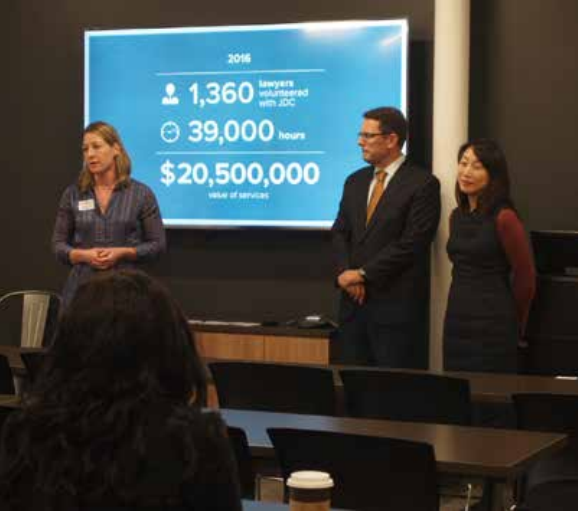
In simple terms, “we get out there and tell people what JDC is doing and how they might engage,” Chun said. Having Heinicke, a partner at Munger, Tolles & Olson, as part of the program made them that much more approachable, as he brought a firm lawyer’s perspective into play. “The nice thing about Malcolm is he appreciates the challenges—how much we give to our practice, to our lives outside of work—and he still pushes us to do more,” said Jennifer Redmond, a partner at Sheppard Mullin, which hosted one of the Road Show’s stops.
Chun and Heinicke tag-teamed well, delivering a presentation that has been described as “well-developed,” “far-reaching,” “succinct” (approximately 45 minutes total), and “really engaging.” At a gathering over lunch at The Veen Firm in October, Heinicke welcomed attendees and expressed his desire to link the Bay Area’s vibrant legal community with JDC’s pro bono program. “We get that you’re all extremely busy lawyers,” he said, “so it’s on us to make it easy and efficient for you.” It was a lofty goal, but one that JDC has delivered on consistently.
For the first 25 minutes, Heinicke and Chun outlined how the program works. The needs are great, and Chun dramatized this with a slide representing a JDC client who brings home $2,500 a month to support a family of four in a city where a one-bedroom apartment rents for $3,500 a month; there is no extra money for hiring an attorney.
She spoke of the “justice gap,” in which there is no right to representation in civil matters such as landlord-tenant and custody cases. In eviction cases, where 95 percent of landlords show up with attorneys and 95 percent of tenants come on their own, even a short-term commitment can make a difference, Heinicke explained. “It’s a limited-scope engagement, training takes a couple of hours, and you, as lawyers, try to work out a resolution in two to four hours of negotiation,” he said.
Heinicke addressed the unspoken concern: “But I don’t know anything about housing!” with “We’ll train you. And your skills as lawyers and negotiators will help you.”
The emotional high point of the presentation was a video of a JDC client, Su Yan, who thanked her attorney for helping her win custody of her daughter and child support. Chun noted that the lawyer helped with just one motion, yet this limited-scope engagement changed this family’s trajectory. Terrance Evans, a partner at Duane Morris, remembers the video from when his office hosted a stop. “I was impressed to see the impact they have in people’s lives. There were photos of real people, real stories, real help,” he said. “There were moments when people were getting a little emotional.”
Following the powerpoint presentation, Chun drew everyone’s attention to the JDC’s Pro Bono Menu of ready-made volunteer opportunities. (Download one at www.sfbar.org/probono-menu.) It’s designed to deliver information at a glance, with coding for projects that are Full-Scope (represented by a whole pizza), Limited-Scope (slice of pizza), Favorites for Transactional Attorneys (heart), and areas for which attorneys need experience or will work under supervision (chili pepper). Under Family Law Projects, Guardianships are tagged with a slice of pizza and a heart. “Represent families in an uncontested petition for guardianship,” reads the description. Training takes three hours, and the time commitment is 15 to 20 hours over three to four months. If that’s too much for your schedule, check out Transactional/Business. Described as “Represent and advise nonprofit organizations,” it requires no special training, and time commitments vary.
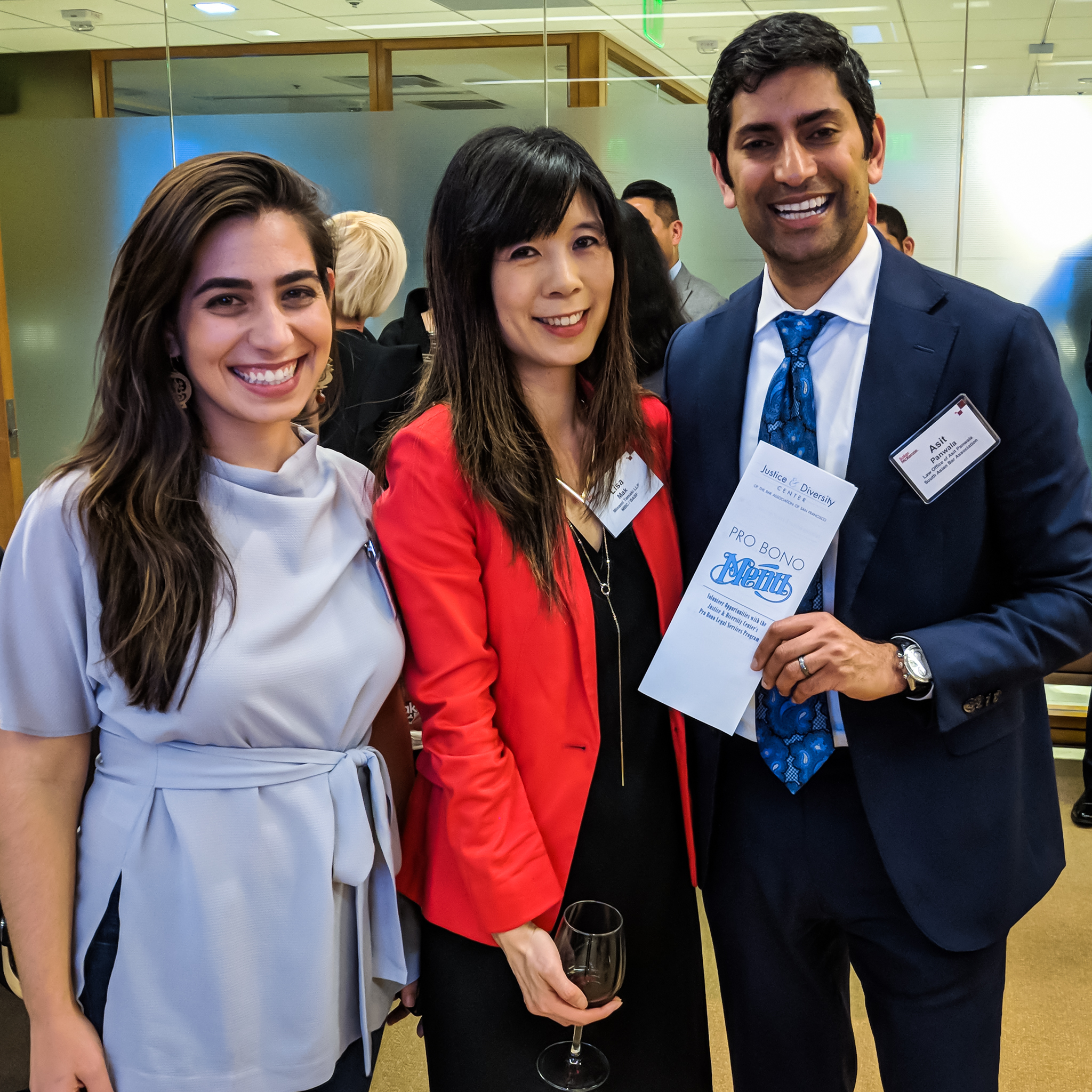
“We want to reduce barriers,” Heinicke said, and he and Chun were ready with answers to attendees’ questions:
“Do you provide malpractice insurance?” (Yes.)
“Do I need background experience?” (Most often, no.)
“Is there a long-term commitment?” (Some projects can be completed in a matter of hours.)
“Are there ways non-attorneys/legal professionals can participate?” (There are opportunities for law students, paralegals, social workers, and interpreters.)
“Can we volunteer as a team?” (Yes.)
Heinicke assured everyone that there was a way for them to contribute. “Meet with the client, listen to them, gain their trust, download the information,” he said. “Everyone is qualified to do that right now.”
Hosts Recognized the Benefits
“People ask ‘How can we do more? How can we help all the injustice we’re seeing?’ We’re lawyers, and we believe in people being represented. Let’s engage with people, show them we care.”
—Malcolm A. Heinicke
Most stop hosts had well-established pro bono programs, so their reasons for hosting a stop went beyond the basics. Uber was looking to build and maintain its program. “One of Uber’s core values is to ‘Celebrate our cities’ in which we live and work,” said the company’s Director of Legal-Privacy Derek Care. “Launching the pro bono program [in 2016], and giving our department members opportunities to serve their communities, was a unique way of living up to that value.” Uber is now looking to expand partnerships with its pro bono partners.
Sheppard Mullin has worked closely with JDC for some time, so they saw hosting a stop as a way to inspire their people to do more. “We thought, let’s do this as a celebration of the work we do and to say ‘thank you,’” said Redmond.
Hosts also recognized the career benefits from doing pro bono work. “It benefits younger lawyers, gets them in the courtroom, while we provide mentoring, training, and supervision,” says Chun. “Many attorneys go outside their comfort zones,” Redmond said. Sheppard Mullin’s employment lawyers have used their experience giving advice and counsel to assist in asylum, adoption, and immigration cases. Using resources from BASF and JDC, Evans last year took on a conservatorship case that saved an elderly woman’s life and a domestic violence case.
Hosting also created networking opportunities. Attendees were often a mix of attorneys, legal assistants, and paralegals. Uber’s event included a Zoom conference call, so more people could get the information, and The Veen Firm invited members of San Francisco Trial Lawyers Association, so multiple firms were represented.
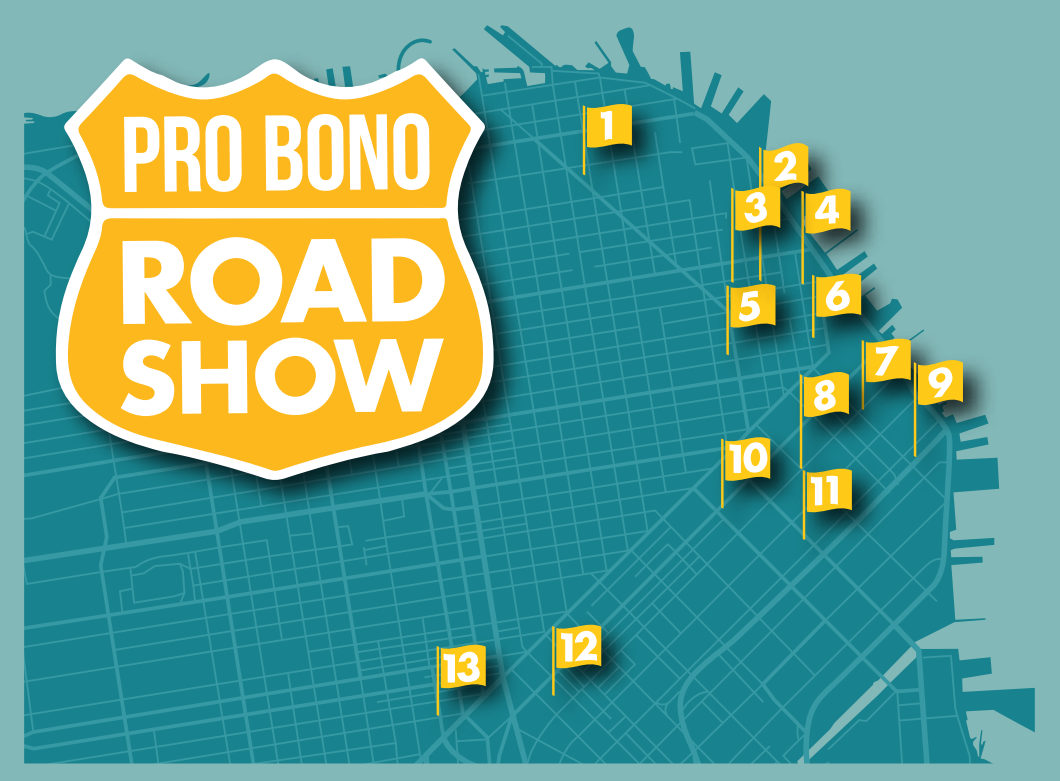
Stops provided openings to network outside of the hosts’ firms and companies. “There’s also partnering, contact with other lawyers, developing relationships in the community,” said Deborah Daniloff, Assistant General Counsel at Bank of America.
One creative partnership that came out of a desire to provide pro bono work developed between Bank of America’s internal legal team and McGuireWoods. Daniloff has been very involved with JDC for several years. She has a litigation background, so she took a case, then realized she needed a process server. “I called David [Reidy, a partner with McGuireWoods] and asked him to give me some pointers on online filing. David volunteered to help,” she said. The idea to partner on future cases blossomed from there. “Both teams wanted to do pro bono work,” said Reidy, “but in-house departments aren’t ideally positioned to handle court filings. (Yet) they had resources we didn’t have.” Daniloff continued the story. “Afterward, David said, ‘We should do this more formally, get more people involved.’” They had a couple of training sessions with JDC, and have since teamed up to work on family law, domestic violence, divorce, and guardianship cases. “If they’re busy, we can cover client meetings, or if we’re busy, they can cover for us,” Reidy said. “The model has proven such a success, we hope to do more.”
The Marks of Success
While many of the hosts have metrics to measure the success of their pro bono programs (typically, number of people participating or number of hours volunteered), JDC did not conduct any formal evaluation of the Road Show. “The mark of success is how many of these stops we do,” said Heinicke, and he and Chun averaged two per month throughout 2018. “Obviously, I’m hopeful that people will volunteer,” he said, “but my mission is that people know about the opportunities and programs we offer.”
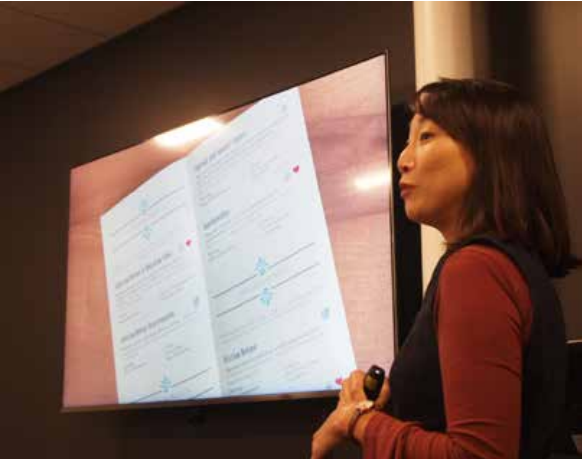
“The responses have been positive,” said Chun. “People told us how glad they were to hear about the work we do.” At one stop, she recalled, a few people volunteered on the spot for the Housing Clinic, but she has learned to not be discouraged when there aren’t immediate signups. “I get calls two years later, with people saying, ‘Now I have time,’” Chun said. “We’ve gotten interest from people directly, asking how they can get more involved,” Kulkarni said after the stop at Duane Morris, “and people have told me they reached out to JDC directly.” Chun has heard of attendees distributing extra menus to colleagues and filing menus for future reference when their schedules do allow for pro bono projects. “Malcolm and I consider it a success,” she said.
It’s also encouraging to note that JDC serves close to 9,000 people every year. In 2017, 1,320 lawyers volunteering with JDC provided 44,200 hours of pro bono work, with a value of services of $23.2 million. Imagine what volunteers might contribute in 2019.
Road Show Plans for 2019…and Beyond
Although the official push ended with Heinicke’s term as president, JDC will continue to offer the Pro Bono Road Show program, with Chun and JDC Pro Bono Manager Jay Lee co-presenting. (See the sidebar for contact information.) They’d like to engage with more in-house departments and coordinate groups of small and solo practitioners.
There are many good reasons to connect with JDC and start or build your pro bono program. “It feels great, you can help people, you can provide training for your team,” said Redmond. “Why not do it?”
“The most rewarding parts of my career are from pro bono work,” said Evans. “When you’ve given someone their life back, their dignity back, that sense of reward and accomplishment is far greater than what you can do for institutional clients.”
“People ask ‘How can we do more? How can we help all the injustice we’re seeing?’” Heinicke said. “We’re lawyers, and we believe in people being represented. Let’s engage with people, show them we care.”
Get Involved:
Contact Jay Lee, pro bono manager, at 415-782-8970 or jlee@sfbar.org
Visit www.sfbar.org/volunteer
Sign up for a training at
www.sfbar.org/probono-trainings
Host a Pro Bono Road Show stop:
Contact Gloria Chun, managing attorney and director of pro bono legal services, at 415-782-8980 or gchun@sfbar.org
About the author:
Kathleen Guthrie Woods is a San Francisco-based freelance writer and a regular contributor to San Francisco Attorney. Previous articles include “Understanding the Crisis in Our Immigration Courts” (Spring 2015) and “Let’s Lose the Booze: Rethinking Networking Events” (Summer 2018).


